- Home
- Blake Pierce
Death (and Apple Strudel) (A European Voyage Cozy Mystery—Book 2) Page 20
Death (and Apple Strudel) (A European Voyage Cozy Mystery—Book 2) Read online
Page 20
Tanneberger stared at her for a moment.
Something in his steady gaze chilled her. She sensed that he suspected her more than before.
I might be his only serious suspect, she realized.
But why? Did he have some sort of erroneous evidence that she didn’t know about? She guessed probably not. But if he and his team hadn’t turned up any leads or suspects on shore, of course his suspicions would lead straight back to her.
She wanted to ask him whether he had any other serious suspects, but she quickly decided it was best not to pry.
Finally Tanneberger said, “I’d like to talk to this couple—the Fiores—before I leave.”
Captain Hays picked up his phone and said, “I’ll call them and let them know you want to see them.”
Tanneberger said to London, “I don’t doubt that your companions will confirm your whereabouts. However, there’s still the matter of the exact time of death. Unless you can prove you were not at the theater at the exact moment when Olaf Moritz was killed …”
“I wish I could prove I wasn’t, sir,” London said.
“If you think of anything that would do that, please let me know.”
“I’ll do that, sir.”
London gulped hard and added, “Sir, I—I really didn’t have any motive for killing Ms. Hartzer.”
Tanneberger’s expression darkened further.
“So you say,” he replied.
London was on the verge of insisting that she was telling the truth.
No, that might only make things worse.
Meanwhile, the captain had finished his phone call and spoke to Tanneberger.
“I just talked to Tina Fiore. She and her husband are expecting you right now in their stateroom, which is right here on this level. I’ll accompany you there and introduce you to them.”
“Danke, Captain,” Tanneberger said. “After I talk to them, I would like permission to stay aboard the Nachtmusik and talk to people however I find appropriate.”
“Of course,” the captain said.
Everybody left the captain’s stateroom. Captain Hays led the Polizeidirektor down the passageway toward the passengers’ quarters, and Bob, London, and Sir Reggie stopped in the little foyer in front of the elevators.
“So where are you off to now?” Bob asked London.
“To the restaurant to get some breakfast,” London said. “What about you?”
Bob let out what was obviously meant to sound like an enigmatic chuckle.
“That’s always the question, isn’t it?” Bob said. “Where am I off to? What am I up to? There are people aboard this boat who would love to know the answer to that question. There sure are.”
He turned the mirrored glasses down toward Sir Reggie and wagged his finger at him.
“As for you, pal—always be vigilant! That’s the true secret of being a topnotch K-9 investigator! Vigilance!”
The elevator arrived and Bob dashed inside. London just stood there in the foyer and waved for him to go ahead on his own. As the doors closed, London shook her head with bemusement. Despite Bob’s attempt to be inscrutable and mysterious, she didn’t much care where he was off to or what he was up to …
As long as he doesn’t cause any real trouble.
But Polizeidirektor Tanneberger was another matter. She didn’t know what to expect from him.
As London and Sir Reggie started up the stairway, her cell phone rang.
When she took the call, all she could hear was some kind of loud, rhythmic, rumbling, crashing noise.
CHAPTER THIRTY ONE
London tried to shout over the noise on her cell phone, “Hello?”
No one spoke back right away. She struggled to identify the strange sounds coming from the phone.
Was that some kind of music?
Then she heard a voice speaking loudly over the noise.
“Ms. Rose, this is Carol Weaver.”
London remembered that Carol and Steve Weaver were the middle-aged couple who had bought a couple of the musician dolls.
“Oh,” London shouted back. “Are you all right?”
When Carol replied, London could detect agitation and alarm in the woman’s voice, but could barely hear her over the noise.
She could only make out two words: “Please help!”
The call abruptly ended.
London checked the passenger list on her phone. The couple’s stateroom was number 206, which was on the Romanze deck, and she and Reggie were already almost there on the stairway.
She dashed the rest of the way up and into the passageway, where she again heard the noise. With Sir Reggie alongside her, she hurried to their door and knocked.
Carol opened the door.
Now the sound blasted clearly enough that London realized what it was.
A heavy metal song was playing at an almost deafening level.
“Can you help us get rid of this?” Carol shouted.
London saw that Carol’s husband, Steve, was poking desperately at the music console beside their bed. She walked over beside him.
“I just bumped it with my elbow,” he said loudly. “I can’t make it stop.”
London looked at the console and saw that the button Steve had been frantically pushing was slightly crooked. London wiggled the button a bit. It was stuck, but after a little pressure and a twist, it popped back into place.
The music came to a merciful end.
“Oh, thank goodness!” Carol said.
London drew a breath of relief.
She smiled with satisfaction at being able to solve this problem in such a low-tech manner.
“What kind of music would you rather be listening to?” she asked.
Carol said, “Before this happened, we were listening to some nice Vivaldi.”
London pushed the buttons for the appropriate channel at a lower sound level, and some pleasant Baroque music began to play.
London’s ears were still ringing as Carol and Steve thanked her for her help.
“That’s what I’m here for,” she said. “Do you want me to send someone in to adjust that button?”
Steve looked embarrassed. “I’ll be able to fix it myself if that happens again. I guess we both panicked.”
“Just call me whenever you need anything at all,” London said as she left the room.
As she walked toward the bow of the ship, London realized that solving that simple problem for the Weavers had felt good. That’s what her job was supposed to be— keeping the passengers happy.
So what are you doing worrying about a murder instead? she asked herself.
After all, she always had plenty of work to do, and most of it was quite satisfying.
If only the cruise wasn’t held up, she thought.
If only I wasn’t a suspect.
Under the circumstances, she didn’t have much choice but to worry about the murder. Even so, she decided to get a quick breakfast, then just go about her ordinary routine on the ship.
She noticed that Reggie was no longer with her and guessed that he’d fled the noise on account of his sensitive canine hearing.
Well, he has free run of the boat, she thought. I guess he won’t be joining me for breakfast.
She went on into the ship’s Habsburg Restaurant and sat down at an unoccupied table. Just like yesterday, she noticed some of the other passengers were eyeing her suspiciously. And was she becoming paranoid, or did she see a young couple whispering to one another as they watched her?
Again, London realized she was losing the trust of the very people whose happiness was her most important duty. She remembered, too, how Tanneberger had asked Captain Hays’s permission to stay aboard the Nachtmusik and freely talk to its passengers.
About me, no doubt, London thought.
If rumors were starting to circulate about her, what might people tell him?
Her situation seemed to be going from troublesome to truly dire.
But what was she going to do about it?
She glanced toward the kitchen and saw Bryce smiling and waving at her from the serving window. He was obviously too busy to come out and chat with her. Even so, she found it nice to see someone looking at her in a thoroughly non-suspicious way.
Meanwhile, she felt as though her ears were still ringing. It wasn’t just the out-of-control heavy metal music that was buzzing through her head. It was the troubling exchange of words she’d had just now with the Polizeidirektor.
He’d said he was going to ask Tina and Rudy Fiore to confirm that she’d been with them at the café when Olaf Moritz was killed.
But even if they could, Tanneberger made it clear that he was unlikely to be satisfied.
“Unless you can prove you were not at the theater at the exact moment when Olaf Moritz was killed …”
But how could London possibly do that?
The waiter arrived, and she asked for some coffee before she ordered. But her eyes wouldn’t focus on the menu. Her mind was wandering in all sorts of disturbing directions. For example, she remembered Emil’s unsettling words and behavior when they’d talked last night.
“So now I know the truth,” Emil had said. “You think I am—or might be—a murderer.”
Ever since then, she’d been trying to convince herself that she thought nothing of the kind. But was that true? And if she did suspect Emil, shouldn’t she report her concerns to Polizeidirektor Tanneberger?
No, she decided she couldn’t let her suspicions run away with her. Surely Emil would never murder someone merely out of jealousy about conducting a tour, or over an issue as trivial as being corrected about who wrote the Austrian national anthem.
Which still left London with an important question …
No matter how much she wanted to, could she really stop thinking about the murder and just go about her regular job?
Yesterday she’d felt sure that none of the people in her tour group had killed Olaf. She found herself feeling even more convinced of that right now. And yet Tanneberger was here aboard the Nachtmusik pursuing nonexistent clues pointing to London’s own guilt.
And wasting valuable time, she thought.
As long as London hadn’t managed to clear herself of suspicion, the killer was still at large—and possibly still dangerous.
London sighed. Her routine couldn’t return to normal just yet.
I’ve got to do something. But where to begin?
Well, there was one thing she had never followed up on.
London took the folded piece of paper that Selma Hahn had given her yesterday out of her vest pocket. It had the name and phone number of Greta Mayr, the young maintenance woman who had been in the building when London had discovered Olaf Moritz’s body.
London remembered how distraught Greta had been about the tour guide’s death—which was hardly any surprise, since she seemed to have known the man.
London also remembered how emphatically Greta had insisted, “I don’t know anything at all.”
London hadn’t quite believed her then, and wasn’t sure she believed her now. But then, did it matter whether London believed her or not? The police had just started to interview Greta Mayr when London was heading back to the Nachtmusik with Emil and Tanneberger. Surely the police had found out everything Greta might know.
Or had they?
London picked up her cell phone and punched in the number.
When she got Greta on the phone, she said in German, “My name is London Rose. We met yesterday under … terrible circumstances.”
“Oh—yes,” Greta said. “It was … terrible.”
“I was just wondering …”
London hesitated.
“Greta, I’ve been very concerned about what happened to Olaf Moritz. The police have already asked me questions, and I know they’ve asked you questions as well …”
“Yes, they have,” Greta said, heaving a sigh.
“But if it’s not too much to ask … well, I was wondering if perhaps we could meet and talk about it.”
“I don’t think so,” Greta said.
Of course not, London thought.
The woman was still traumatized. London didn’t want to pressure her. But even so, she felt desperately in need of some answers. She quickly decided to be honest and to the point.
“Greta, the police seem to be thinking of me as a suspect.”
She heard Greta let out a gasp.
“Oh—but I’m sure they are wrong,” she said.
London breathed a little more easily, although she knew she shouldn’t be surprised. Greta had seen London the moment after she had found the body. Naturally Greta had known what Tanneberger couldn’t know—that London’s distress had been genuine, and not that of a killer.
“I’m glad you think so,” London said. “But I’m sure you understand, this is a problem for me. I work on a river tour boat, and our cruise is being delayed because of this, so it’s also a problem for the company I work for. But more than anything else … I don’t want the police wasting their time and energy.”
A silence fell.
London wondered whether Greta was giving her request some serious thought, or if she was just trying to think of a polite way to say no.
“Will you be at the House for Mozart today?” London asked.
“No. Frau Hahn—the director—gave me the day off.”
London set down the menu she’d found herself too distracted to read.
“I haven’t had breakfast yet, have you?”
“No.”
“There’s a nice little outdoor café right near the House of Mozart. Do you know it?”
“The Altstadtcafé, yes.”
“Could you meet me there shortly?”
London held her breath for a moment waiting for a reply.
“Yes, I will,” Greta said.
Then she abruptly ended the phone call.
London sat staring at the phone for a moment. Something in Greta’s voice told her that the young custodian knew more than she had told the police.
And I’ve got to find out what it is, she decided.
Ignoring any inquisitive stares from other customers, London put the menu down and hurried out of the Habsburg Restaurant.
CHAPTER THIRTY TWO
The prospect of meeting with Greta Mayr recharged London’s energy and sense of purpose.
Maybe I’ll get to the bottom of this murder once and for all, she thought as she headed for the elevator. Resisting the temptation to just slip away without letting anyone know, she dutifully tapped a hasty text message to Amy, asking her to watch over things for a while.
Amy won’t be happy, London realized.
But of course, Amy seldom seemed happy about anything these days.
When the elevator reached the Allegro deck, London hurried to her stateroom. She found Sir Reggie there, lapping from his water bowl.
The little terrier let out a friendly yap of greeting.
“So there you are,” London said. “I was wondering where you’d run off to.”
When she picked up her handbag and headed back toward the door, Sir Reggie dashed into the open closet.
“What are you doing?” London asked.
Sir Reggie reappeared with one of his leashes in his mouth.
London chuckled.
“I guess you can tell I’m going ashore,” she said. “But I won’t be gone long.”
When London turned toward the stateroom door again, the dog scurried over and placed himself between London and the door. He sat there, looking at her expectantly, the leash still in his mouth.
London couldn’t help but laugh.
“I don’t know,” she teased him. “You seem to be having plenty of fun on your own, now that you’ve got the run of the ship. You hardly bother with me anymore. I wouldn’t want to bore you …”
Sir Reggie let out a mild growl of protest.
“OK, if you insist,” London said
.
She stooped down and clipped the leash to his collar. When London and Sir Reggie left the stateroom, she paused for a moment in front of the door to Mr. Tedrow’s stateroom. She felt sure that he was still in there, wearing pajamas and typing away at his novel. And of course, he had no idea about all the trouble that was unfolding around him. He was happily oblivious to everything except his own make-believe mystery.
It must be nice, she thought enviously.
She wished the mystery she was trying to solve wasn’t so awfully real.
She and Sir Reggie took the elevator up one level, then descended the gangway off the boat into Salzburg. They followed the now-familiar route past the Mozarts Geburtshaus toward the House for Mozart.
The outdoor café where she’d briefly joined Tina and Rudy Fiore yesterday was just across the large, paved terrace outside the theater. Although Greta Mayr had agreed to meet London there today, she wasn’t sitting at any of the tables.
I just hope she shows up, London thought, remembering how nervous Greta had sounded over the phone.
She sat down at a small table beneath a wide umbrella. Sir Reggie jumped up into her lap, but she lifted him over into one of the other chairs, where he lay down contentedly. When the waiter came to the table, she ordered the Wiener Frühstück—a simple “Viennese Breakfast” with coffee, rolls, jam and butter, and orange juice.
As she waited for both Greta and her food order to arrive, London took in the pleasant view of the pedestrian street lined with colorful vendor stalls and little shops. Clothes, food, flowers, crafts, and lots of other items were on display and it looked like both locals and tourists were cheerfully shopping.
A melancholy thought crossed her mind.
Mom had recently been here in Salzburg.
Not only that, but she’d stayed long enough to make friends—at least with Selma Hahn and her family. But now, like London herself, those friends missed her and wondered where she’d gone.
London’s breakfast order arrived. She hesitated before eating, but it was really starting to seem as though Greta Mayr wasn’t going to show up.

_preview.jpg) Once Gone (a Riley Paige Mystery--Book #1)
Once Gone (a Riley Paige Mystery--Book #1) Left to Hunt (An Adele Sharp Mystery—Book Nine)
Left to Hunt (An Adele Sharp Mystery—Book Nine) Left to Kill (An Adele Sharp Mystery—Book Four)
Left to Kill (An Adele Sharp Mystery—Book Four)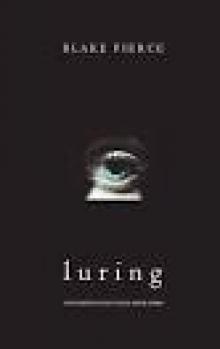 LURING
LURING If She Hid
If She Hid If She Fled
If She Fled Already Gone (A Laura Frost FBI Suspense Thriller—Book 1)
Already Gone (A Laura Frost FBI Suspense Thriller—Book 1) Vengeance in Vienna
Vengeance in Vienna Once Shunned
Once Shunned Left To Run
Left To Run Face of Fury (A Zoe Prime Mystery--Book 5)
Face of Fury (A Zoe Prime Mystery--Book 5) Blake Pierce - Kate Wise - 5 - If She Fled
Blake Pierce - Kate Wise - 5 - If She Fled IF SHE RAN
IF SHE RAN Left to Envy (An Adele Sharp Mystery—Book Six)
Left to Envy (An Adele Sharp Mystery—Book Six) Silent Neighbor
Silent Neighbor Her Last Wish (A Rachel Gift FBI Suspense Thriller—Book 1)
Her Last Wish (A Rachel Gift FBI Suspense Thriller—Book 1) Almost Lost
Almost Lost Before He Harms
Before He Harms Murder (and Baklava) (A European Voyage Cozy Mystery—Book 1)
Murder (and Baklava) (A European Voyage Cozy Mystery—Book 1) Left to Vanish (An Adele Sharp Mystery—Book Eight)
Left to Vanish (An Adele Sharp Mystery—Book Eight) THE PERFECT IMAGE
THE PERFECT IMAGE The Perfect Affair (A Jessie Hunt Psychological Suspense Thriller—Book Seven)
The Perfect Affair (A Jessie Hunt Psychological Suspense Thriller—Book Seven) Left To Die
Left To Die BEFORE HE LAPSES
BEFORE HE LAPSES Left to Prey (An Adele Sharp Mystery—Book Eleven)
Left to Prey (An Adele Sharp Mystery—Book Eleven) The Perfect Neighbor (A Jessie Hunt Psychological Suspense Thriller—Book Nine)
The Perfect Neighbor (A Jessie Hunt Psychological Suspense Thriller—Book Nine) Almost Dead
Almost Dead The Perfect Wife
The Perfect Wife The Perfect Smile
The Perfect Smile If She Saw
If She Saw Left To Die (An Adele Sharp Mystery—Book One)
Left To Die (An Adele Sharp Mystery—Book One)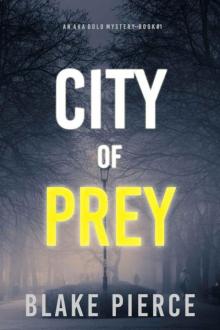 City of Prey: An Ava Gold Mystery (Book 1)
City of Prey: An Ava Gold Mystery (Book 1)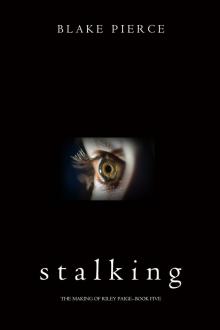 Stalking
Stalking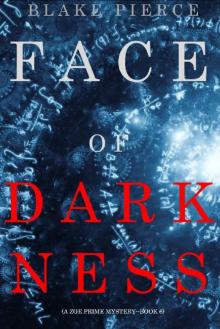 Face of Darkness (A Zoe Prime Mystery—Book 6)
Face of Darkness (A Zoe Prime Mystery—Book 6) The Perfect Mistress (A Jessie Hunt Psychological Suspense Thriller—Book Fifteen)
The Perfect Mistress (A Jessie Hunt Psychological Suspense Thriller—Book Fifteen) Girl, Vanished (An Ella Dark FBI Suspense Thriller—Book 5)
Girl, Vanished (An Ella Dark FBI Suspense Thriller—Book 5) The Perfect Block
The Perfect Block Left to Fear (An Adele Sharp Mystery—Book Ten)
Left to Fear (An Adele Sharp Mystery—Book Ten) Almost Gone (The Au Pair—Book One)
Almost Gone (The Au Pair—Book One) The Perfect Facade (A Jessie Hunt Psychological Suspense Thriller—Book Twelve)
The Perfect Facade (A Jessie Hunt Psychological Suspense Thriller—Book Twelve) The Perfect Affair
The Perfect Affair Once Chosen (A Riley Paige Mystery—Book 17)
Once Chosen (A Riley Paige Mystery—Book 17) Girl, Alone (An Ella Dark FBI Suspense Thriller—Book 1)
Girl, Alone (An Ella Dark FBI Suspense Thriller—Book 1) Face of Murder (A Zoe Prime Mystery—Book 2)
Face of Murder (A Zoe Prime Mystery—Book 2) The Perfect Mistress
The Perfect Mistress Crime (and Lager) (A European Voyage Cozy Mystery—Book 3)
Crime (and Lager) (A European Voyage Cozy Mystery—Book 3) Before He Harms (A Mackenzie White Mystery—Book 14)
Before He Harms (A Mackenzie White Mystery—Book 14) Face of Fear
Face of Fear Left to Murder (An Adele Sharp Mystery—Book Five)
Left to Murder (An Adele Sharp Mystery—Book Five) Left to Vanish
Left to Vanish The Perfect Secret (A Jessie Hunt Psychological Suspense Thriller—Book Eleven)
The Perfect Secret (A Jessie Hunt Psychological Suspense Thriller—Book Eleven) The Perfect Deceit (A Jessie Hunt Psychological Suspense Thriller—Book Fourteen)
The Perfect Deceit (A Jessie Hunt Psychological Suspense Thriller—Book Fourteen) Blake Pierce - The Making of Riley Paige - 4 - Taking
Blake Pierce - The Making of Riley Paige - 4 - Taking Death (and Apple Strudel) (A European Voyage Cozy Mystery—Book 2)
Death (and Apple Strudel) (A European Voyage Cozy Mystery—Book 2) THE PERFECT HOUSE
THE PERFECT HOUSE Cause to Save
Cause to Save Face of Fear (A Zoe Prime Mystery—Book 3)
Face of Fear (A Zoe Prime Mystery—Book 3)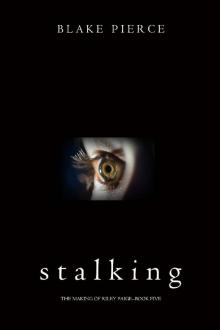 Stalking (The Making of Riley Paige—Book 5)
Stalking (The Making of Riley Paige—Book 5) A Neighbor's Lie
A Neighbor's Lie The Perfect Neighbor
The Perfect Neighbor Once Dormant
Once Dormant A Trace of Crime
A Trace of Crime CAUSE TO DREAD
CAUSE TO DREAD Already Missing (A Laura Frost FBI Suspense Thriller—Book 4)
Already Missing (A Laura Frost FBI Suspense Thriller—Book 4) Waiting
Waiting If She Knew
If She Knew If She Feared (A Kate Wise Mystery—Book 6)
If She Feared (A Kate Wise Mystery—Book 6) Left To Run (An Adele Sharp Mystery—Book Two)
Left To Run (An Adele Sharp Mystery—Book Two) Left to Lapse (An Adele Sharp Mystery—Book Seven)
Left to Lapse (An Adele Sharp Mystery—Book Seven) If She Hid (A Kate Wise Mystery—Book 4)
If She Hid (A Kate Wise Mystery—Book 4) The Perfect Alibi (A Jessie Hunt Psychological Suspense Thriller—Book Eight)
The Perfect Alibi (A Jessie Hunt Psychological Suspense Thriller—Book Eight) Once Taken
Once Taken Before He Envies
Before He Envies Before He Sins
Before He Sins Mackenzie White 07-Before He Sins
Mackenzie White 07-Before He Sins ONCE BOUND
ONCE BOUND Once Buried
Once Buried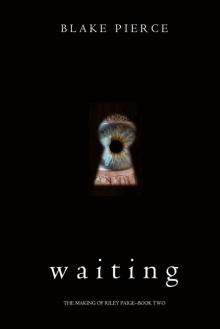 Waiting (The Making of Riley Paige—Book 2)
Waiting (The Making of Riley Paige—Book 2) Riley Paige 11-Once Buried
Riley Paige 11-Once Buried Once Forsaken (A Riley Paige Mystery—Book 7)
Once Forsaken (A Riley Paige Mystery—Book 7) Once Stalked (A Riley Paige Mystery—Book 9)
Once Stalked (A Riley Paige Mystery—Book 9) The Perfect Disguise (A Jessie Hunt Psychological Suspense Thriller—Book Ten)
The Perfect Disguise (A Jessie Hunt Psychological Suspense Thriller—Book Ten) ONCE TRAPPED
ONCE TRAPPED Watching
Watching Keri Locke 02-A Trace of Muder
Keri Locke 02-A Trace of Muder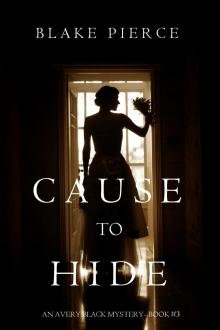 Cause to Hide
Cause to Hide Once Hunted
Once Hunted Cause to Kill (An Avery Black Mystery—Book 1)
Cause to Kill (An Avery Black Mystery—Book 1) Before He Preys
Before He Preys Once Pined
Once Pined A Trace of Hope
A Trace of Hope Once Craved (a Riley Paige Mystery--Book #3)
Once Craved (a Riley Paige Mystery--Book #3) Once Lured
Once Lured Before He Sees (A Mackenzie White Mystery—Book 2)
Before He Sees (A Mackenzie White Mystery—Book 2) Before he Kills (A Mackenzie White Mystery—Book 1)
Before he Kills (A Mackenzie White Mystery—Book 1) Keri Locke 03-A Trace of Vice
Keri Locke 03-A Trace of Vice Once Cold
Once Cold ONCE LOST
ONCE LOST Before He Takes
Before He Takes Before He Covets (A Mackenzie White Mystery—Book 3)
Before He Covets (A Mackenzie White Mystery—Book 3) BEFORE HE NEEDS
BEFORE HE NEEDS